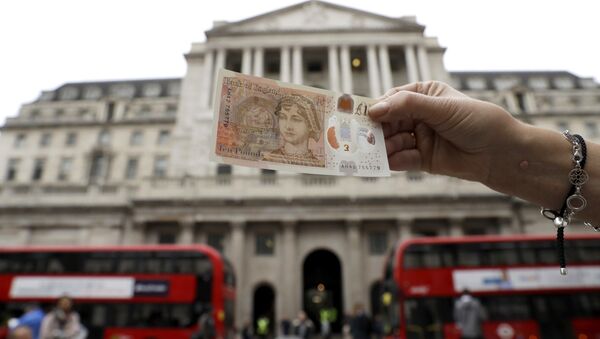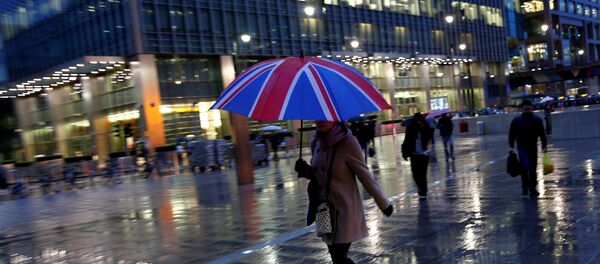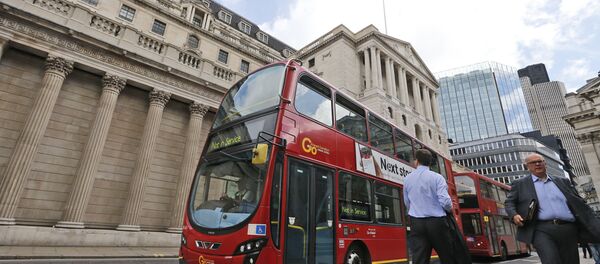Kristian Rouz – A raise in the Bank of England's (BoE) base borrowing costs is almost certainly on the way due to above-target inflation and an improved foreign trade outlook. However, Brexit is still affecting the country’s economic confidence, as the UK and the EU struggle to negotiate a post-Brexit framework for bilateral exchange in services, goods, and employment.
BoE Governor Mark Carney says the regulator expects inflation to continue to accelerate in October and November, rendering a rate hike almost inevitable by the year-end. This would be the UK’s first increase in borrowing costs in roughly a decade.
READ MORE: Amid Moderating Growth, Further Path for UK Economy Uncertain
UK consumer prices increased by 3 percent in September, overshooting the BoE’s official target of 2 percent. This comes after August inflation was recorded at 2.9 percent. The pace of expansion in consumer prices is currently the highest since March 2012, when the British economy was recovering from the consequences of the European debt crisis.
"Interest rates have to rise to help tackle inflation and the sooner this happens, the better,” Calum Bennie of Scottish Friendly says. “Consumers have been dealt a double blow of poor income growth and rising shop prices over the past year. For many, this has increased dependency on credit, but defaults (are) now on the rise."
A hike in base interest rates indeed helps tackle inflation, but it also has negative effects on GDP growth. Many observers have expressed their scepticism over the BoE’s expected raise in borrowing costs, as the UK’s pace of economic expansion is tepid due to the deteriorated investor sentiment and uncertainty surrounding the Brexit process.
Britain has enjoyed an expansion in its manufacturing sector and a rise in exports following the Brexit vote last year, and its stock market has repeatedly hit record highs, defying investor concerns. However, overall economic growth has been mediocre at 1.5 percent in mid-2017, whilst the EU – driven by the powerhouse German economy and the booming Eastern European markets – saw its GDP accelerate to 2.3-percent annualised expansion.
The UK's labour productivity is stagnant at its 2007 levels, according to the OECD report, whilst real household disposable incomes have slipped 0.2 percent year-on-year in Q2.
READ MORE: Falling Figures: UK Labor Productivity Drops in Q2 as Economy Nears Stagnation
This means the BoE’s tightening of monetary policies would require a fiscal stimulus. Yet, the cabinet of Prime Minister Theresa May does not seem to have a plan aimed at cutting taxes and increasing infrastructure spending. Fiscal austerity, as practiced by the cabinet at this point, coupled with the negative effects the higher interest rates would entail to the GDP, could hamper longer-term economic expansion in the UK.
"On one hand, the BoE doesn’t want to heap pressure on borrowers by raising rates, potentially slowing economic growth from an already glacial pace," Laith Khalaf of Hargreaves Lansdown says. "On the other hand, consumer borrowing is rising at quite a clip, and inflation is also heading in the wrong direction, both of which suggest a rate rise is in order."
In UK inflation continues overshooting the BoE’s target, and the central bank opts to not raise rates, Governor Carney would have to explain to Chancellor of the Exchequer Philip Hammond the reasons behind the BoE’s inaction.
Higher interest rates could also hinder the ongoing rebound in UK exports, as the pound sterling’s FX rate would go up, whilst floating-rate mortgages of an overall decreased affordability of credit would squeeze the UK’s consumer market.
The Exchequer would have to react to a rate hike by ensuring an increase in average wages and overall household incomes, which is hardly feasible under the cabinet’s current austerity policies.






